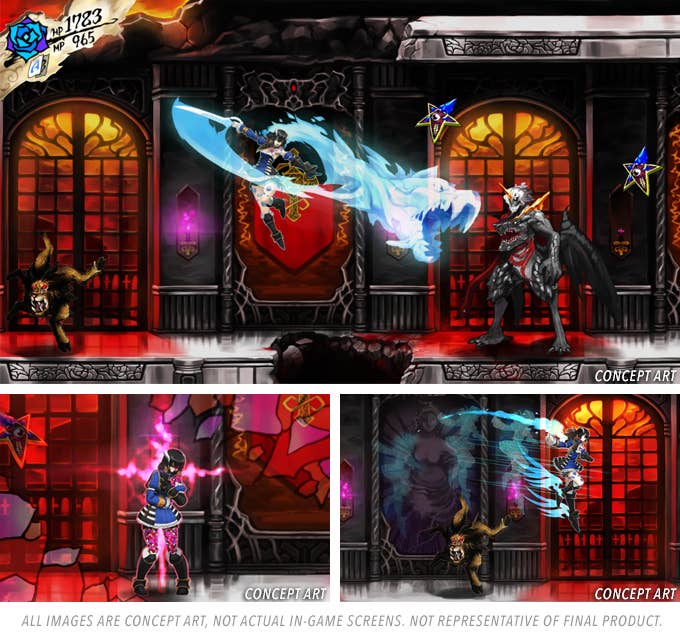Veterans play to the Crowd
The backlash against established devs taking to Kickstarter seems to have dissipated; crowdfunding may have rescued an entire tier of game development
As I write this, the Kickstarter for Koji Igarashi's spiritual successor to Castlevania: Symphony of the Night is sitting comfortably on almost $2 million - four times the asking price, after only a couple of days live. Aside from being a timely if not exactly comfortable reminder of the ongoing trials and tribulations of Konami - Igarashi, after all, belonged to broadly the same elite group of Konami developers as the now seemingly departing Kojima - this is also the latest in a series of hugely successful Kickstarters by very well established developers. Only this week a group of Rare veterans Kickstarted a spiritual Banjo-Kazooie successor, Yooka-Laylee; last week I found myself playing Keiji Inafune's enormously slick Mighty No.9, originally funded through Kickstarter, while friends with rather better PCs than mine still can't shut up about the Kickstarted glory of David Braben's Elite: Dangerous.
So... We're okay with this, now? I ask because I do distinctly remember that there was a period when a lot of people were quite distinctly not okay with this - "this" being the use of Kickstarter by extremely famous, well-established veteran developers and teams, rather than plucky amateurs and newcomers. While there was a broad acceptance that reviving an effectively commercially dead genre like adventure games was a reasonable thing for a veteran to do with Kickstarter, there was a strong backlash against veterans who sought to use the platform to raise funds simply to allow them to continue their careers independent of the existing publisher system.
"Crowdfunding is paying for the lower-budget, more niche audience targeted genres that big publishers have seemingly decided to abandon, and rebuilding a whole class of development studio into the bargain"
Either that attitude is pretty much gone, or those who hold it have acknowledged that the battle is lost, because I've struggled to find any such reaction to recent Kickstarter campaigns. I suppose part of the reason is simply that much of the reasoning behind the objections has turned out to be false. Huge crowdfunding campaigns by established studios and individuals, or even bringing back established franchises, haven't choked the life out of smaller crowdfunding efforts as many people seemed to fear. Rather, each huge campaign has brought a new audience of its own to the concept of crowdfunding; it doesn't seem unreasonable to imagine that people who created a Kickstarter account to back something from a famous developer might find themselves poking around to see if there's something interesting and worth throwing a few dollars at elsewhere on the site.
Moreover, while I remain concerned that the other shoe is going to drop regarding the exact nature of Kickstarter pledges - and a lot of consumers are genuinely going to be angered to discover that they're neither legally nor morally the same as a pre-order - the first few years of the crowdfunding movement have been smoother sailing than most dared to imagine. The really big implosions have generally not been for especially enormously funded projects. Some bullets have been dodged; Ouya turned out disastrously, but people got what they paid for (it just turned out that what they were paying for wasn't a very good idea to begin with); Godus still remains, from my perspective, a cynical and selfish abuse of the crowdfunding model, but has delivered enough to scrape a passing grade and avoid a truly huge amount of fallout. The successes, meanwhile, have been high-profile and wonderful enough to cover up any number of smaller failures; from Broken Age to Elite: Dangerous, from Pillars of Eternity and Wasteland 2 to Oculus Rift, which isn't in consumers' hands yet but is already the most technologically astonishing leap forward for game immersiveness since hardware 3D acceleration.

As a consequence, we're now a lot more comfortable - or at least, a lot less vocally uncomfortable - about people already at the top of the industry turning to the audience for funding. That's good, because right from the outset of crowdfunding it's really been the possibility of unleashing the creativity of veteran developers that has been exciting. It's wonderful that this is open to newcomers and that some of them are getting funded and producing good games; that's a vital part of the concept too. Intrinsically, though, the strength of Kickstarter isn't just about providing money - it's far more than that. It's proof of concept, proof of demand, financing and marketing, all rolled up together; it's quite a big swathe of what a publisher used to provide, not just the financial component. Kickstarter greenlights your project, in essence, not based on the whims of a room full of people who may or may not actually ever touch a gamepad, but on the desires of the audience articulated through their wallets; in the process it gives you enormous exposure, a ready-made group of devoted, vocal, heavily invested fans; the kind of marketing money generally can't buy. It's proved itself to be the perfect riposte to the publishers' reason for declining so very many games; "there isn't a market for it any more". There is, and they just paid the development budget.
In truth, though, what Kickstarter is enabling is a new tier of development. With the exception of something like Star Citizen - which is sufficiently bizarre that I can't quite wrap my head around it - most crowdfunded games aren't working with modern AAA budgets. The money they raise, at most, is pretty much the budget you'd expect from last generation's B-ranked games. It's a lot of money, but it's not the kind of money that goes into making something like Destiny or Titanfall - and that's why games like that aren't, and probably never will be, on crowdfunding services. They don't need to be; they're blatantly, extraordinarily commercial and can justify enormous budgets. Crowdfunding is paying for the lower-budget, more niche audience targeted genres that big publishers have seemingly decided to abandon, and rebuilding a whole class of development studio into the bargain.
"We're well past the gold rush stage here; nobody is getting funded for a handful of concept sketches and a few vague gameplay details"
That there are still wrinkles in the fabric is clear. A lot of potentially interesting crowdfunding campaigns fail because there's a lack of understanding of what it takes to succeed; the degree to which your game, its concept, its assets and its project plan need to be pinned down and relatively well progressed before you ever launch a crowdfunding campaign is something that creators often underestimate. We're well past the gold rush stage here; nobody is getting funded for a handful of concept sketches and a few vague gameplay details. Moreover, the Kickstarter system itself is still flawed - as was agonisingly, tragically shown this week when 2Awesome Studio's modest Kickstarter for its vertically scrolling shooter Dimension Drive failed at the last second thanks to the cancellation of a fraudulent $7000 pledge presumably placed as a deliberate trolling stunt. Hardening a system which is designed to operate on the good faith and enthusiasm of the crowd against the deliberate maliciousness of some members of that crowd is a tough thing to do, and Kickstarter must be vigilant and responsive in future (and hopefully, sympathetic to this particular case too) if it's to avoid the service becoming a target for trolling and abuse.
The risks of crowdfunding remain; as I said, I still don't think the penny has dropped with many consumers about what exactly it is that they're paying for when they fork over money to a Kickstarter campaign, and I fear the backlash when that awareness is forced upon them by a truly high-profile project implosion. I'm confident, though, that Kickstarter has become an effective part of the game development ecosystem. The gold-rush is over, and Kickstarter remains as an important source of funding for certain types of project. It's never going to be the right way to fund everything - but it's rescued an entire tier of games and a whole range of genres from commercial obscurity, and is serving to make games a more interesting, diverse and exciting place. Besides, who can argue against anything that gets us a shot at a decent successor to Symphony of the Night?

